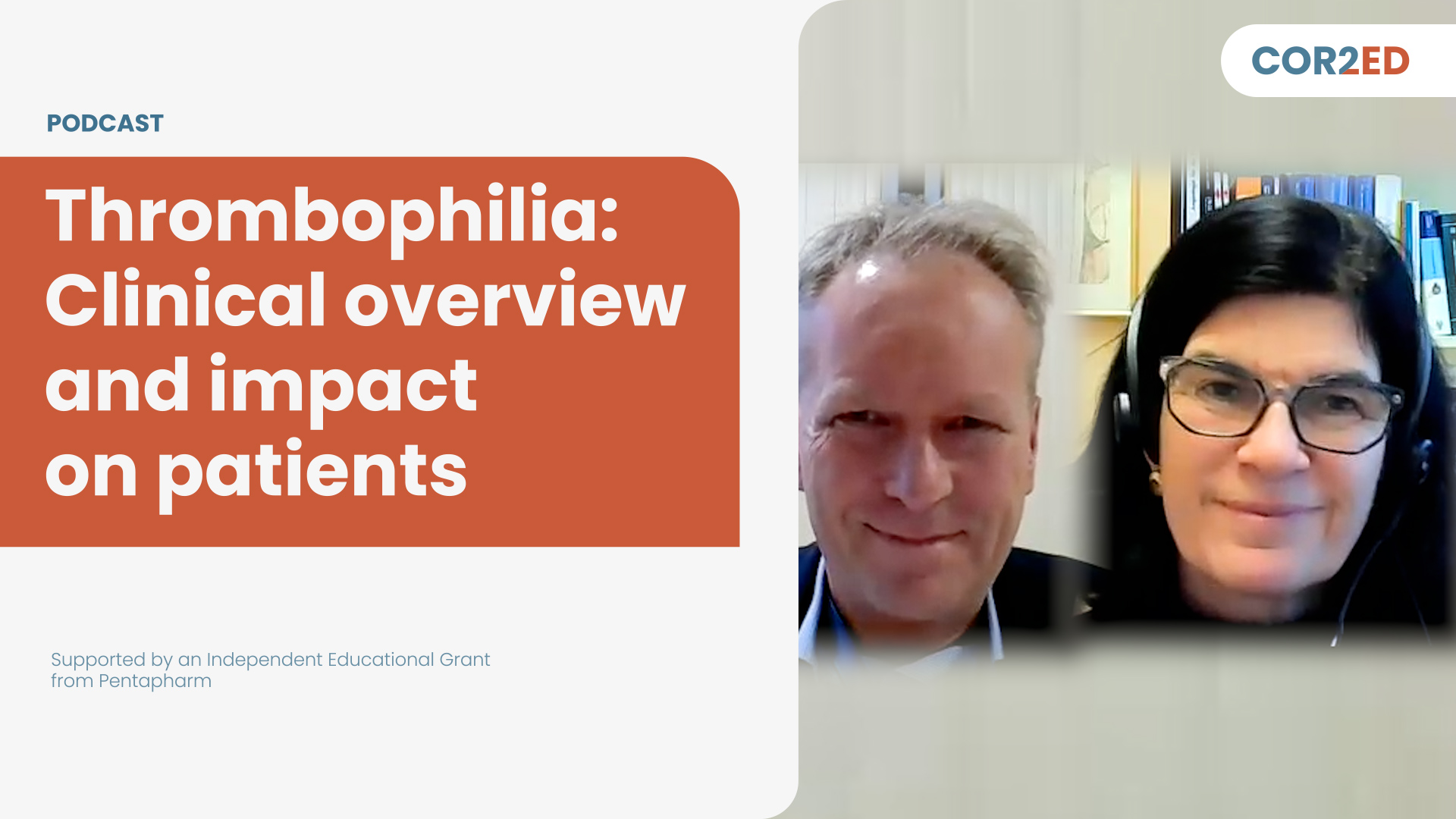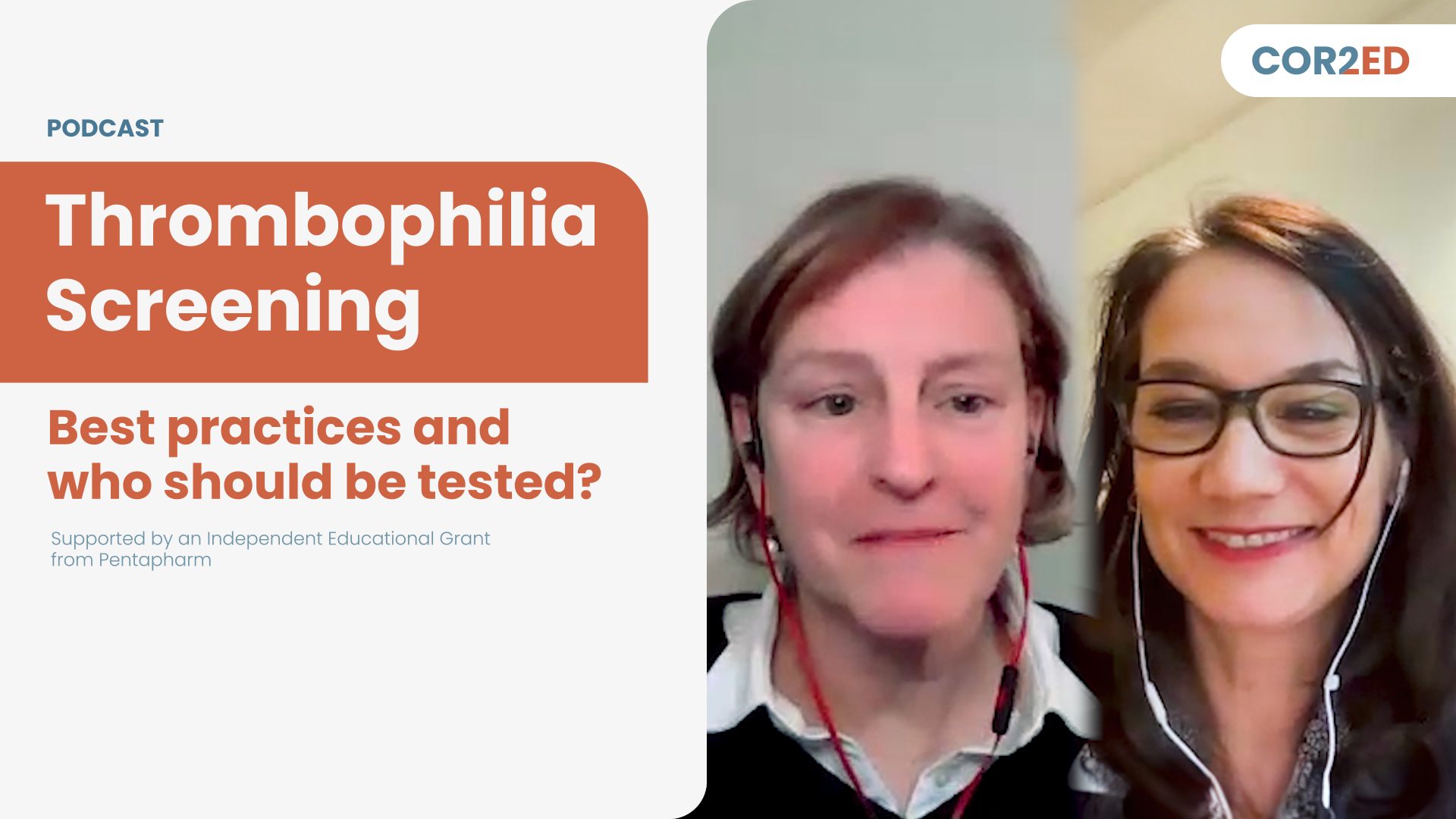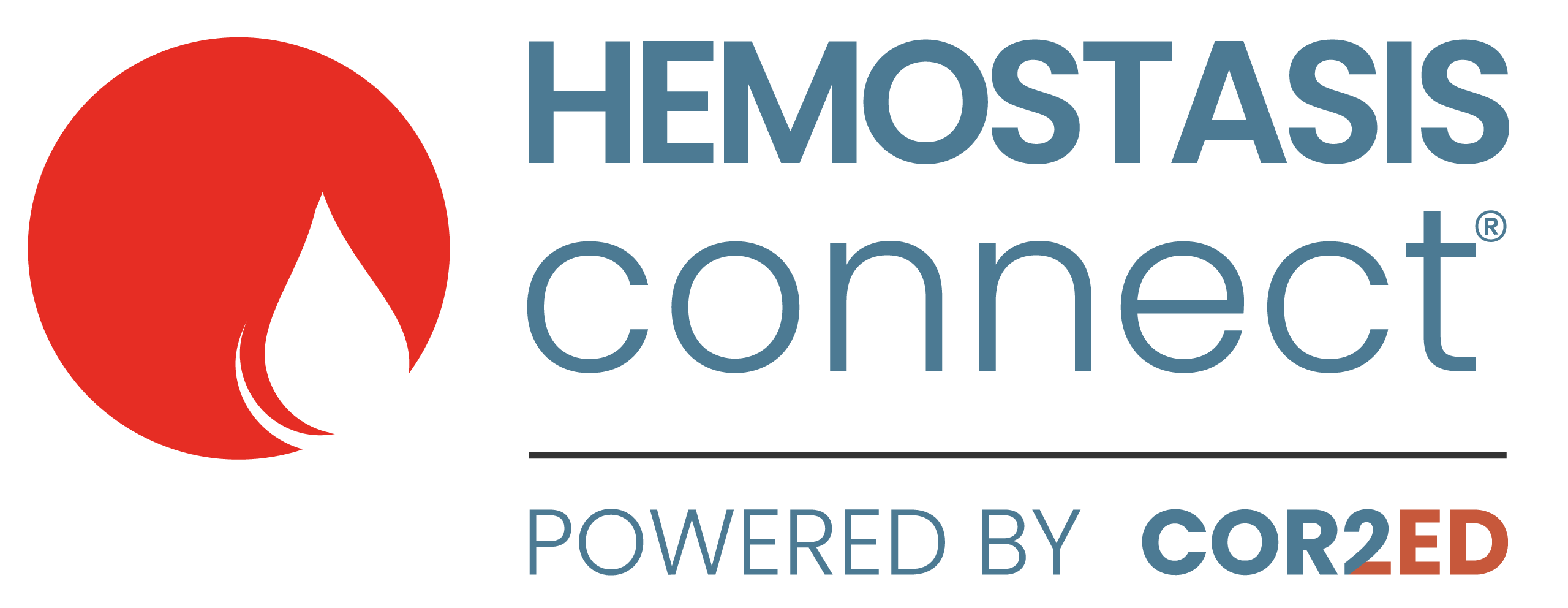Thrombophilia Screening: Best Practices and Who Should be Tested?
Brought to you by
Prof. Saskia Middeldorp, Internist Vascular Medicine, Head of the Department of Internal Medicine, Radboud university medical center, Nijmegen, The Netherlands
Prof. Jean Connors, Hematologist, Medical Director of the Anticoagulation Management Services, and the Hemostatic Antithrombotic Stewardship Program; and Professor of Medicine Harvard Medical School, Boston, Massachusetts, USA
Please note:
HEMOSTASIS CONNECT podcasts are designed to be heard. If you are able, we encourage you to listen to the audio or watch the video, which includes emotion and emphasis that cannot be grasped from the words on the page. Transcripts are edited for readability. Please check the corresponding audio before quoting in print.
Tonke de Jong
Thrombophilia is the term used for inherited or acquired risk factors for thrombosis in the blood. There’s an ongoing debate regarding when screening should be performed and who to screen. What’s the role of thrombophilia screening in general practice? And which patients can benefit from screening and what are the implications? Listen or watch to find out! This is the second podcast episode in a two-part series on thrombophilia. In this episode, the experts will explore the impact of thrombophilia screening and who can benefit most from screening. This podcast is an initiative of COR2ED and is supported by an independent educational grant from Pentapharm. I’m honoured to introduce to you today’s two experts; Professor Saskia Middeldorp who is head of the Department of Internal Medicine at the Radboud University Medical Center in Nijmegen, The Netherlands and Professor Jean Connors who is Medical Director of the Anticoagulation Management Services, and the Hemostatic Antithrombotic Stewardship Program; and Professor of Medicine at Harvard Medical School, Boston, Massachusetts, USA. We’re very excited to listen to your discussion.
Welcome to this podcast and it’s great to speak with Dr. Connors about one of our favourite topics, which is thrombophilia. Dr Connors and myself, we know each other very well, so we will be calling each other by our first names. My name is Saskia Middeldorp, and I'm an Internist in the Netherlands. And just to remind you why this is such an important topic is because there are so many clinical questions that are being asked by patients with thrombosis or pulmonary embolism with regard to thrombophilia. But not only patients but also their relatives and patients who have been tested in totally different contexts, for instance, pregnancy complications, and sometimes even population testing. And Jean, it's a pleasure to do this with you. Maybe you can say a few words about your experience.
Prof. Jean Connors
Thank you, Saskia. I'm delighted to be here with you to discuss this topic. I think you mentioned the patient anxiety and patient aspects about what testing means for the patients and their family members even in the context of pregnancy loss. But I also find that clinicians in our area, we are a big tertiary referral hospital at Brigham and Women's Hospital and we have community practitioners who test patients for thrombophilia, but then aren't quite sure what to do with the results. And I think that addressing these questions now will be very helpful for our listeners.
Prof. Saskia Middeldorp
I agree, of course. So if we are speaking about thrombophilia, what do you consider, let's say, established thrombophilias?
Prof. Jean Connors
It’s a great question these days because when I give presentations or lectures to fellows and residents and community providers, I start by saying there are only five known, validated, inherited thrombophilias. We have the Factor V Leiden mutation and the prothrombin gene mutation. Both of those are mutations that are prothrombotic and lower the threshold for people to get a clot. Then there are deficiencies from mutations in the three natural anticoagulants: Protein S, Protein C and antithrombin, which makes it harder to have that procoagulant anticoagulant balance. And that also sets people up for risk. There are other tests that people have been looking for in many different ways, whether it's elevated Factor VIII levels or low Factor XI levels that have not truly been validated as having a high association with thrombosis, and I generally do not test for those. I don't know, Saskia, what your practice is.
Prof. Saskia Middeldorp
I agree. I think it's important to note, particularly the Factor VIII levels. I've done quite some research back a couple of decades ago and there is some heritability to it, but it's not like blue eyes and brown eyes I always explain to my patients and there's also a huge association with age and inflammatory diseases, so it gets messy. So we try to get that out of our thrombophilia panels. We really should keep it simple. For the inherited thrombophilias established means that there is a true association with the generally venous thromboembolism and of course, we were speaking about antiphospholipid syndrome. So what do you think, Jean? Did we make a lot of progress over the last decade in terms of knowing when to test for thrombophilia or not?
Prof. Jean Connors
I think it's an excellent question. And I think the fact that we're having this podcast now says that we've made some progress and people are more aware. You know, ASH: American Society of Hematology had a Choosing Wisely campaign about not testing for thrombophilia. But I find that there's still a lot of uncertainty and lack of knowledge outside of our coag presence in the world. Right, or coagulation specialists. So you're an internist, but you know coag, I’m a hematologist, but I know coag. There are many even hematologists or say, cancer medicine doctors that don't understand the role of testing in patients, never mind the emergency departments or the in-patients that get tested, at least in like in the United States, we see people sending these panels at times when we might not do that. I think we still need educational efforts to, not only define what we include in a thrombophilia panel but also when to test and who to test. I mean, I see 78-year-olds getting thrombophilia panels tested for the first time.
Prof. Saskia Middeldorp
Yes, that's a waste of a waste of money I would think. So if we just geared towards, let's say, people, our colleagues who are being confronted with acute VTE, let's speak - venous thromboembolism, ER doctors. What would your message be in terms of thrombophilia testing in a patient with an acute pulmonary embolism, for instance?
Prof. Jean Connors
That is a great question. And I think that, you know, whenever you are faced with that patient, they need anticoagulation no matter what the underlying cause or factors or risk factors. Right. So testing for thrombophilia at that point in time does not change your management, but for the activity assays, the protein C, protein S and antithrombin there are reasons with an acute clot or if someone is tested after anticoagulation is started and we see this a lot in the emergency department, someone gets a dose of a heparin for example, and then they have protein C or protein S activity, or they're on oral contraceptives and they get tested and then they get labelled with a deficiency that may not be accurate. So the message is that testing at the time of an acute clot is not necessary because it doesn't influence your management and it can lead to false results. You may want to comment on the antiphospholipid antibodies at this time and testing because we both know that acute infection, and inflammation can give values and results in antiphospholipid antibodies that may not persist. So, you know, I don't know what your experiences with that, but I see people again tested frequently and again, the clot-based assays, the lupus anticoagulant, the kaolin clotting time, the DRVVT, are all affected by anticoagulants and particularly the direct early anticoagulants.
Prof. Saskia Middeldorp
I agree. I think you really perfectly mentioned the pitfalls of testing in the acute phase. And I think the main message could be do never test in an acute phase unless you have consulted with a coagulation expert in very rare cases. But I think an overall key message would be don't do it. It doesn't change your management. Patients’ needs to be anticoagulated and this can all be considered carefully in an outpatient, hopefully, outpatient setting after let's say the acute event. That is at least how we approach it in our hospitals. So we have reduced the thrombophilia testing by educating our folks about these pitfalls. If we then move on let's say to what would be a potential consideration to perform testing. I think in general we can say never test everybody that is never good, although I must say, and I find this interesting, that for instance, the Choosing Wisely campaign by ASH that you mentioned is not as, let's say, black and white, as I just spoke about the emergency setting. So very often it is being said to test young people with a strong family history. What are your thoughts? I know we are probably going to agree very much, but what do you think about that recommendation?
Prof. Jean Connors
I think it is not always straightforward, as you noticed and I still adhere to the strong provoking risk factors model of thought where I know the European Society of Cardiology certainly for PE is suggesting that anyone who has a PE should always be anticoagulated and we should not dichotomize between provoked and unprovoked. But if you have somebody who you know was a young person and had a major trauma, say they were in a motor vehicle accident and had multiple orthopaedic surgeries, it's not surprising that they might get a clot and testing for thrombophilia in that situation is not going to help because my personal approach would be that was a clear, strong factor and that patient does not need lifelong anticoagulation. And what I see is that our ortho people might send this on to the inpatient screening for inherited from thrombophilia and find heterozygous Factor V Leiden and then the patient is you know doomed if you will to lifelong anticoagulation. So I think there are nuances that are sometimes hard to get across. I think the goal of not testing people who had provoked VTE is important unless you know what you're going to do with the results. For example, a 45-year-old man who has a PE but has daughters who might consider oral contraceptives another controversial topic, right? Because the strength of the inherited thrombophilia is sometimes a factor in decision-making. I will say, and I'm sure you've experienced this when you have people who come into the clinic and they have a very strong family history of thrombophilia, multiple family members with clots in their twenties and thirties, you can guarantee that they have an increased risk. Thrombophilia testing may not and should not, in my view, affect your treatment decisions at that time. But sometimes patients like to know that they have something.
Prof. Saskia Middeldorp
I agree, in fact, what you're saying is to think about what you're going to do with a test result. And basically I also hear you say we should test if we are changing management, if we're having management consequences. I think this is crucially important and I think indeed very nuanced sometimes we have to be quite knowledgeable about absolute risks because all those relative risks like antithrombin is strongest thrombophilia which is true. But what we really need to know is whether the absolute risk is high enough to change your management in order, for instance, to prolong anticoagulation in a patient with a clot basically forever. Generally we call it undetermined duration, but some people call it lifelong. So let's say the labelling of a person is very important here. Similarly, I think also for the daughters that you just mentioned, indeed controversial depending on the thrombophilia, whether or not you would actually say withhold the oral contraceptives anyway, or only if they have that thrombophilia defect in the family or the pregnancy consequences in terms of postpartum or even antepartum prophylaxis. So it's quite difficult and very difficult also to have strong recommendations here, but I think that quintessence is that you say we need management consequences.
Prof. Jean Connors
I want to circle back to something you said a few minutes ago, which is, consult an expert. I think that if you are a general practitioner or you are not well versed in coagulation, you may want to refer your patient a consultation to discuss whether testing is indicated. The United States has an obesity crisis of 40% of our population. Adults are said to be obese, and when I give lectures on thrombophilia testing, I say less than 10% of the U.S. population and it can vary from country to country has an inherited thrombophilia, I think it's actually less than 8% total, right? People are quick to test for thrombophilia testing, yet for somebody with a BMI of 40 or 44, the obesity risk factor is not even considered. So I think we have to look at, you know, the frequency of testing and apply it appropriately to patients who really do have an increased risk or, as we have discussing, where knowing that factor may change your management approach.
Prof. Saskia Middeldorp
I totally agree and, in my view, let's forget about the fact that we only should test if we were to test young people for, because that is basically geared at the prevalence, the chance that you actually find a thrombophilia. But I don't think that should be guiding our decisions to test. It really should be the management consequences. Yes. So I think we're in total agreement. And the other thing is that if we are thinking about testing, then very often you are referring to the U.S. population. I am from the Netherlands, but there are huge differences in preferences. So for instance, Factor V Leiden and prothrombin mutation are true Caucasian mutations. Of course, we are multi-ethnic but if you are working in another part of the world, for instance, in Southeast Asia or in Africa, the chances that you will find Factor V Leiden are much lower. But for instance, in Asia, Protein S deficiency is much more prevalent. So I think the prevalence is not really the issue. The issue is are we going to change management for the patient in front of us?
Prof. Jean Connors
That's a good point. I think the population prevalences matter, but it is the individual patient and their risk profile and how thrombophilia fits into that. How thrombophilia testing and knowing, I don't think we want to discuss those family members that are negative for say Factor V Leiden but have family members that are positive and what they should do with oral contraceptives because that's a I think I would love to know your opinion on that. Actually, now that I think about it, it is I think, somewhat controversial. Right. We know they have an increased risk. Even if they test negative because of other potential genetic influences.
Prof. Saskia Middeldorp
So my opinion so if we just switch gears to the let's say the female relatives, so let's say you have your 45-year-old male patient, he's got a clot, even if it's provoked, someone tested this patient Factor V Leiden, which is the most prevalent one in our societies, and the daughters, obviously, and the sons as well have 50% chance of having that same thrombophilia. Now, as you say, many studies have shown family history in itself is associated with a 2 to 4-fold increased risk regardless of whether or not there is any thrombophilia, it actually doesn't even predict the presence of thrombophilia. Now, in my opinion, there is some dichotomy. Again, we did a lot of family studies there that even in those families, the women who have Factor V Leiden have a higher risk than the women in that same family who do not have the Factor V Leiden mutation. But overall, indeed it is increased as compared to similar women, similar age who do not have that family who come do not come from that family. Now, the main question here is, is that risk high enough to withhold oral contraceptives? And there it comes to, let's say, a risk of about 0.5 percent per year, which is extremely high for a 20-year-old. But is it high enough for that same 20-year-old who doesn't have any other I mean, you have to consider other methods for contraception or for menstrual issues. But for a 20-year-old, maybe an IUD is not ideal, whereas it is different for that same woman ten years later. I think this really requires careful counselling, and for me, there is no absolute contraindication, but you just have to counsel very well.
Prof. Jean Connors
Exactly. I think we are on the same page about that. I think your points about choosing the patients and knowing what to do with the results are key to the testing.
Prof. Saskia Middeldorp
So we have been speaking about inherited thrombophilia and the prevalences. Of course, we also have this other acquired thrombophilia syndrome, the antiphospholipid syndrome. So are there any specific situations, Jean, where you test for APS?
Prof. Jean Connors
That’s a great question. And I do feel it's a moving target. I test in patients where we don't have an idea of what provoked the clot and when we're talking about venous, see these are the true unprovoked, out of the blue, no travel, no oral contraceptives, no trauma, no surgery, nothing, you know, no infections. Right. And nothing that appears to trigger it. And there's a concern I get much more concerned about arterial thrombotic events in young patients. And those patients I test in, even older patients. I you know, depending on where you draw the line for old but people in their sixties and seventies who have a truly an unexplained, unusual a CNS thrombosis, a stroke, an ischemic stroke. I have found patients who have a high titer, even single positive, persistently positive. And I will test those patients. And sometimes again, controversial if they have a positive ELISA-based assay for beta-two-glycoprotein one or anti-cardiolipin antibodies and they're on an anticoagulant and they've had a severe thrombotic event, particularly arterial. I don't even necessarily stop the anticoagulant to do the clot-based assays and that is a bit of a controversy because we know that triple-positive patients for antiphospholipid tests do better on warfarin.
Prof. Saskia Middeldorp
So a bit different from what I do. We test particularly for arterial in young strokes for instance or in the absence of any atherosclerosis which I think is fairly uncommon in the, let’s say where we draw the line 60’s, 70’s. And here it is indeed also a matter of let's say our suspicion, right? So there is a venous clot out of the blue, there is also some arterial event or maybe some slight thrombocytopenia or, you know, other things. So basically it's trying to find that pattern that fits APS and I think that not everyone in our audience may be aware is the fact that I was quite sceptical at the beginning but we now have pretty consistent albeit low numbers evidence indeed that vitamin K antagonists are superior to direct oral anticoagulants in particularly the, let's say severe triple or lupus anticoagulant positive APS. And I think that's also a take-home message. So here in this case, again, it has some potential management consequences if we find APS. So that would be a reason to I think, lower the threshold of testing, right?
Prof. Jean Connors
I totally agree. I think we are actually on the same page.
Prof. Saskia Middeldorp
So I think we've covered quite a bit. But another controversial area, so the ASH guidelines on thrombophilia testing, Jean. I see you smiling. I am smiling. I had the privilege to be the chair of that very complicated guideline. And I know that you are amongst, let's say, the people who have critically looked at that. But I think it is important to know for our audience that they are out there. They have published very weak recommendations. Can you just give our audience your take home about that, that guideline, please?
Prof. Jean Connors
I'll give the audience my two cents, if you will, as we say in the U.S. think it was an important undertaking for ASH. And I'm glad that you, with your expertise, were the chair in leading it. And I think to your point about weak recommendations, because it's very hard to study this field and the data that are studied. I know there was someone who attempted to do a primary prophylaxis trial, I think in the Netherlands for patients with protein C and protein S, you know, discovered because of family members and they couldn’t get people to adhere. So we don't have a lot of great data in that area. I think my one concern is how it's not so much the recommendations for testing in who to test or whom to test in and when it's the added information that might be going a bit too far about and if they are positive, give lifelong anticoagulation. I think that as I said you know the young woman who's a soccer player who's on combination estrogen progesterone oral anticoagulants has a big injury, gets arthroscopic surgery, gets put in an immobilizer and is on crutches and develops a DVT. Even if she's homozygous for Factor V Leiden, I think, does not warrant lifelong anticoagulation as long as she's counselled about times of increased risk such as further surgeries, prolonged travel, pregnancy, etc. So I think the guidelines should be looked at by everyone. You have an outstanding summary table that I think is great, but some of the treatment decisions, I think we could spend another hour discussing.
Prof. Saskia Middeldorp
Let's not do that, but let's give our audience the take-home message that these are weak recommendations and suggestions and still need to be interpreted with caution and not be followed like a Bible and always put the individual patient in the centre of your decision making. As we say in the Netherlands, it's all shared decision-making. But then you have to, of course, give your patient the ingredients to decide, and that I think is really important. So I think, because of time, and of course, we could go on for at least 2 hours, but probably our audience would be really bored. Are there any future outlooks, Jean, that you are looking forward to that actually are, let's say, tangible for the near future in terms of, for instance, prediction of recurrence of VT, because that is what we try to do right with thrombophilia testing.
Prof. Jean Connors
I think that we are making progress. The fact that we're even having this discussion is important. And I think that in from a laboratory base and in a clinical basis, we're looking at risk prediction scores that are honing in on clinical factors, biomarker factors and trying to come up with a calculator, if you will, for that individualized decision making. We absolutely need that. You know, I think another topic for discussion is the role of low-dose DOAC and prophylaxis, which has changed my decision-making because warfarin with an INR of 2.0 to 3.0 is much more burdensome and, I think in many ways riskier than low dose apixaban or rivaroxaban. So I think can look forward to more information about the factors that can predict for risk. And many, you for example, and others in the world are working on this. I think what we really need for antiphospholipid testing is a functional assay like we have for heparin-induced thrombocytopenia to say which antibodies truly activate thrombosis. And I know that's being addressed in laboratories around the world. So the future looks good for being able to further refine the list of ingredients that an individual patient has that we can use to help predict their risk of future recurrence.
Prof. Saskia Middeldorp
Great. So I'm also optimistic there's a lot to research and in fact we did make progress and we will make progress for the thrombophilia part the take-home message I think the main take-home message is to think before you test and test for therapeutic management decisions rather than your chance of finding something do not test in the acute setting.
Prof. Jean Connors
Agreed.
Prof. Saskia Middeldorp
Great.
Prof. Jean Connors
Completely agree.
Prof. Saskia Middeldorp
So thanks, Jean. It was a pleasure talking to you and I hope we have enlightened
our audience a little bit about this complicated but fun issue. Thank you again. And thanks to the listeners.
Prof. Jean Connors
Thank you, Saskia. And again, thank you for having me on this podcast.
Tonke de Jong
Thank you so much for this interesting discussion. We’ve learned a lot about the impact of screening on thrombophilia, when it’s most relevant to screen and very importantly who to screen to elevate patient care. Don’t miss the first podcast episode where Prof. Hermans and Prof. Eichinger share a clinical overview of thrombophilia. If you enjoyed this and want to find out more about thrombophilia, then please look for the other episodes on the “Hematology Medical Conversation” podcast under the channel of COR2ED medical education. If you liked this podcast, then don’t forget to rate this episode, subscribe to our channel, or inform your colleagues about it. Thank you for listening and see you next time. This podcast is an initiative of COR2ED and developed by HEMOSTASIS CONNECT, a group of international experts working in the field of hemostasis. The views expressed are the personal opinions of the experts. They do not necessarily represent the views of the experts' organisations, or the rest of the HEMOSTASIS CONNECT group. For expert disclosures on any conflict of interest please visit the COR2ED website.










 Downloadable
Downloadable  6 MIN
6 MIN
 Dec 2025
Dec 2025 





